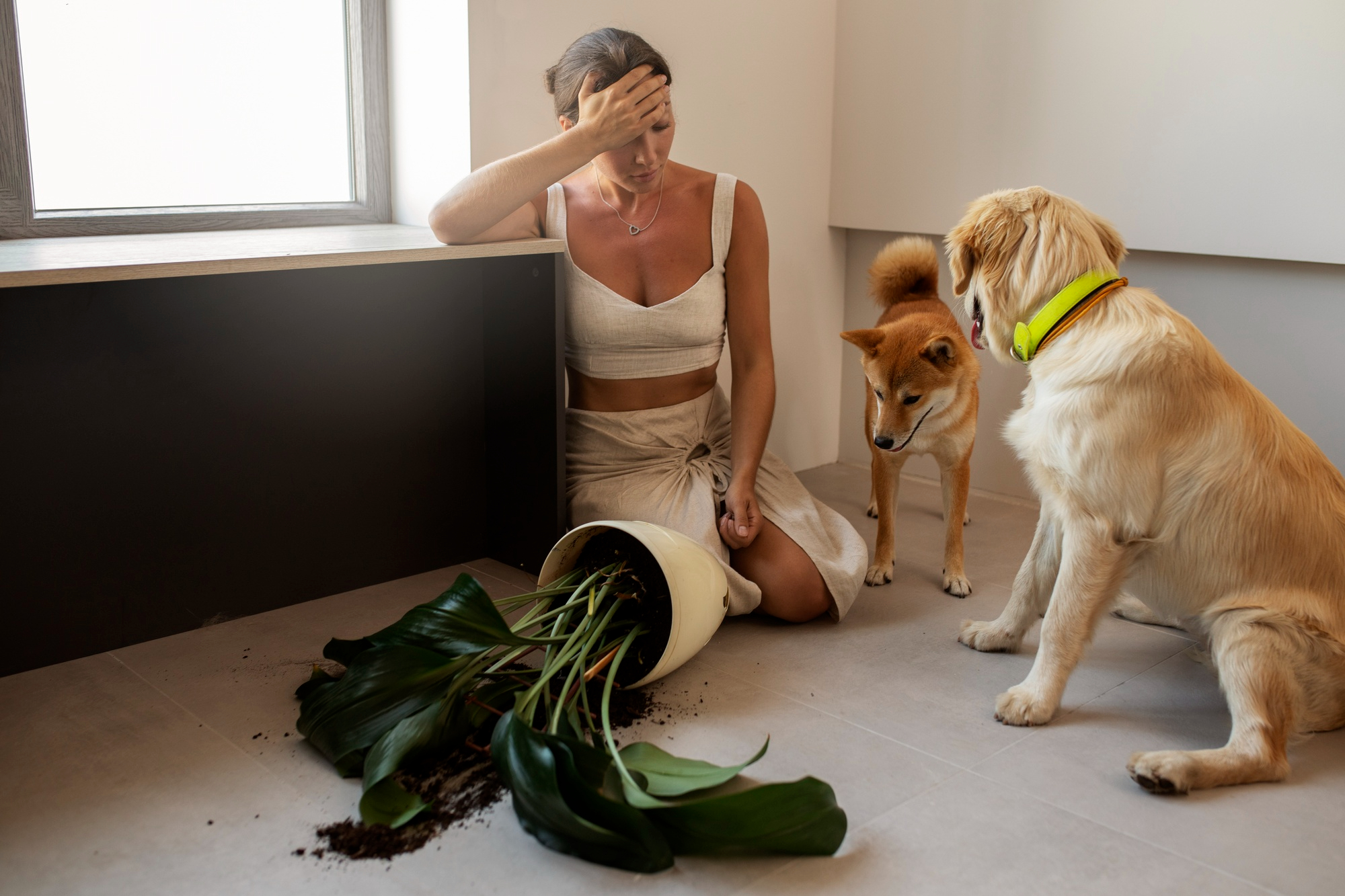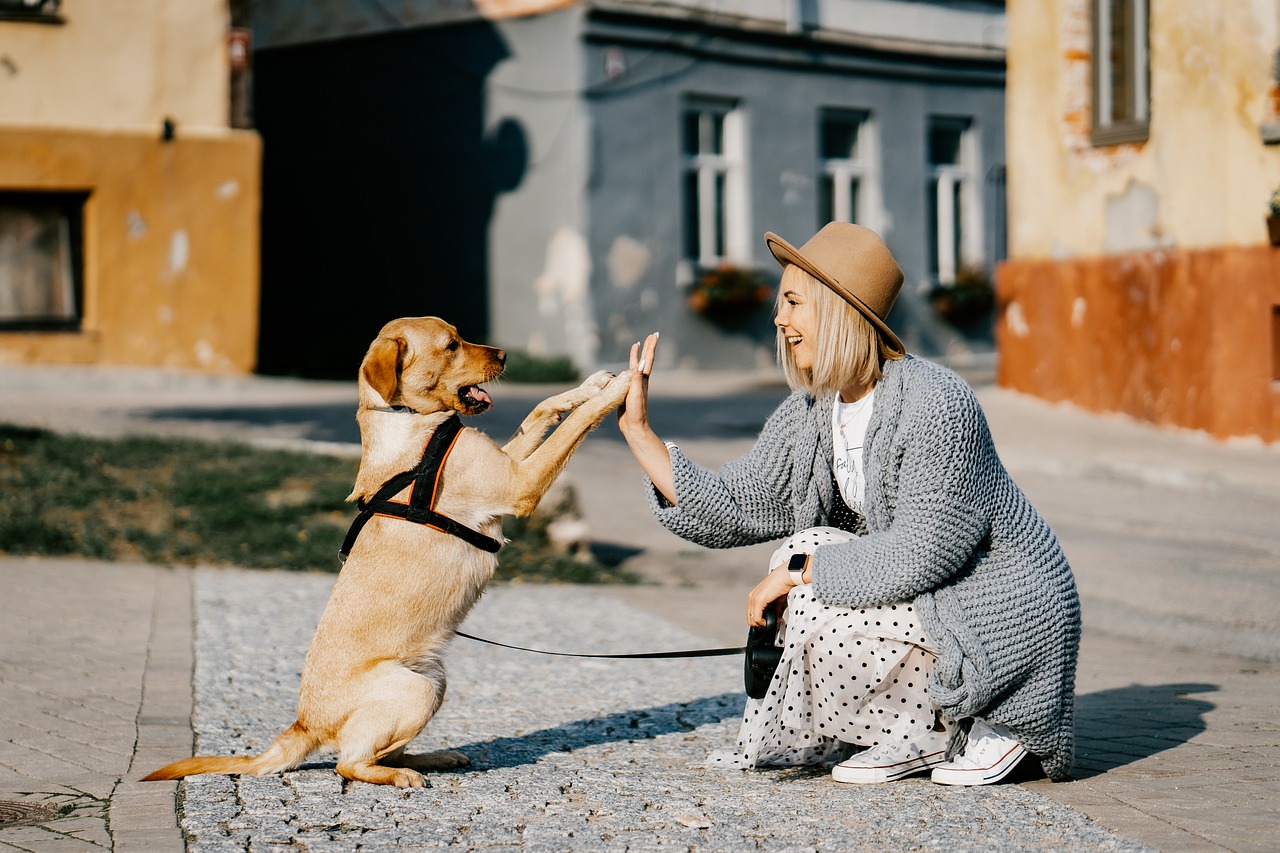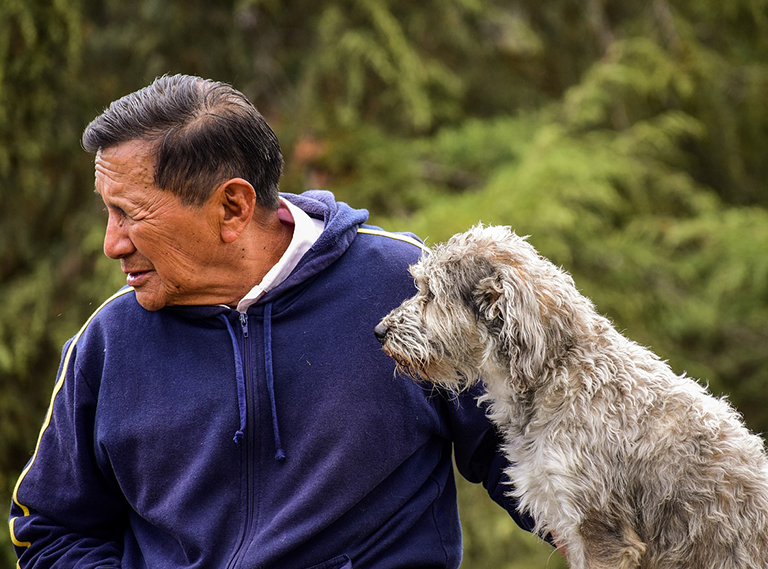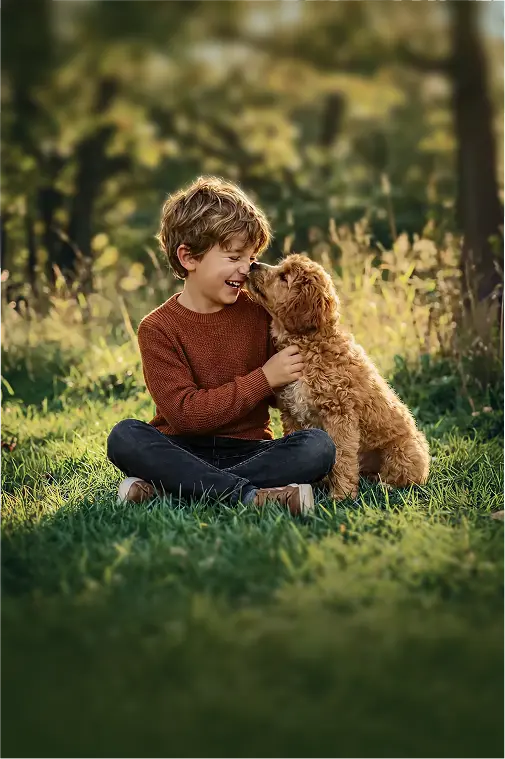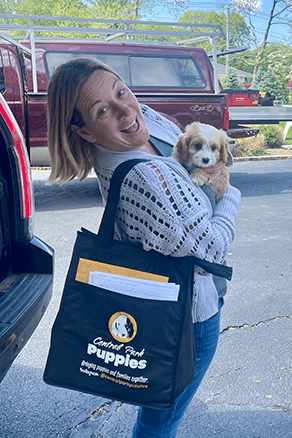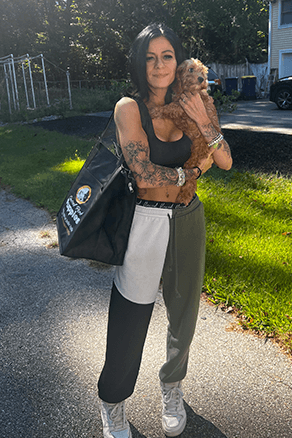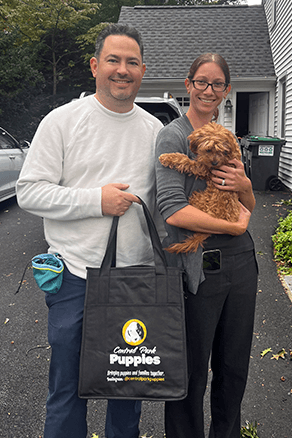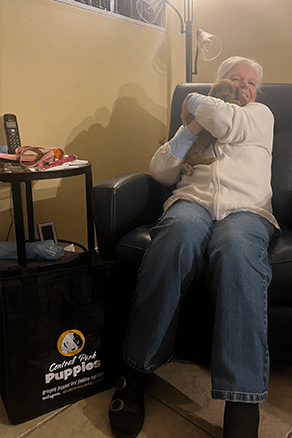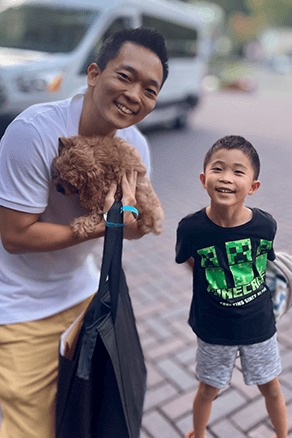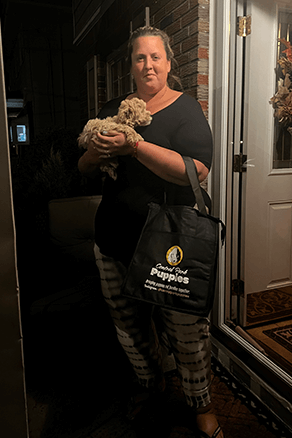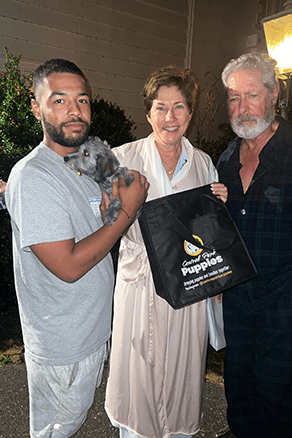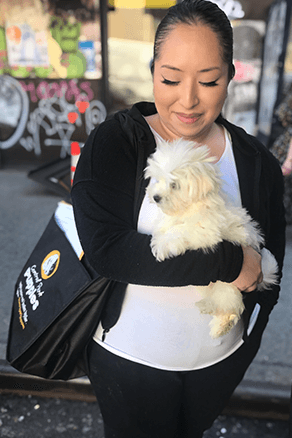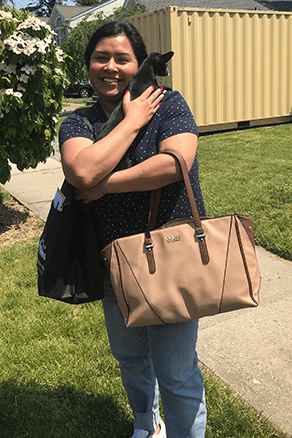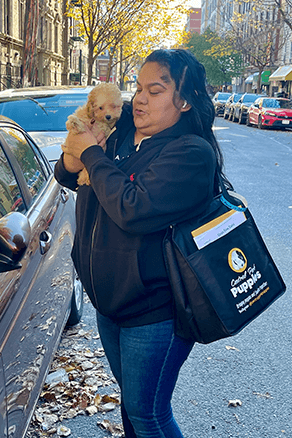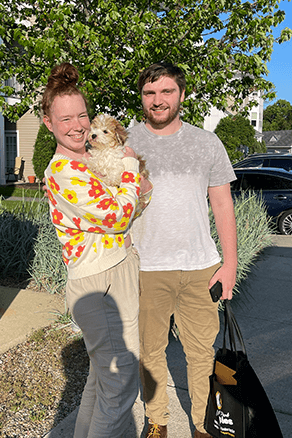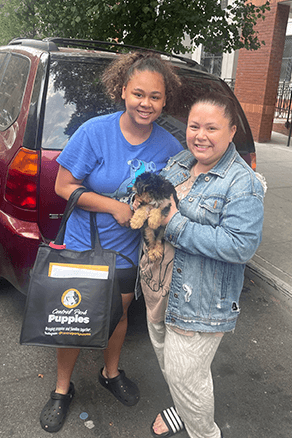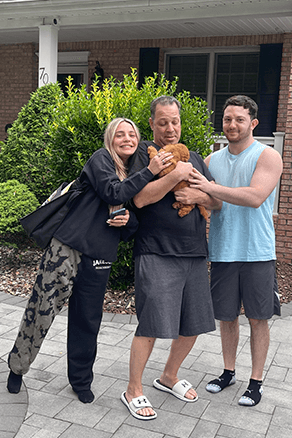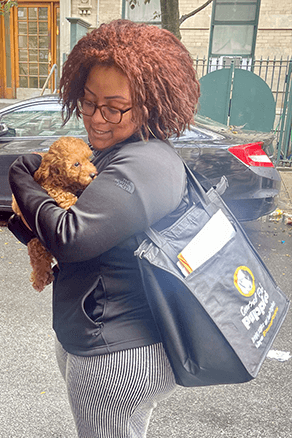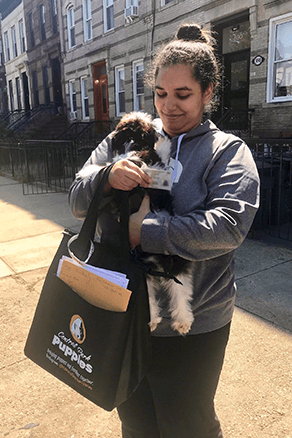Choosing the perfect puppy from a litter is no easy task, and prospective puppy parents must understand how to pick the right puppy for their family. With some research and an experienced breeder, you can ensure your new pup is healthy and happy. In this article, we'll talk about how to pick a puppy from a litter, giving you all the information you need to find the best dog for your family.
How to pick a puppy from a litter | Find the best pup for your family
Finding the right puppy can be daunting, but with a few simple steps, you can determine the best fit. Here are some tips to help you find the perfect pup:
- Get to know the different breeds - research and determine which suits your lifestyle and home environment best.
- Look into reputable breeders or shelters to view a litter of puppies and get an idea of their temperament.
- Consider the size, energy level, and grooming needs of your potential puppy when selecting a dog from a breeder.
- Before committing, ask questions about vaccinations, genetic testing, feeding instructions, health concerns, and training requirements.
- Spend time with the puppy before making any decisions to ensure it is the right one for you.
Decide what type of dog you want
Before selecting a puppy from a litter, do your research. This means familiarizing yourself with different dog breeds and their characteristics. Consider what type of dog you want, from their size and energy level to their grooming needs and suitability for your lifestyle.
The Labrador Retriever is an excellent choice if you're looking for a loyal companion. Known for their intelligence and eagerness to please, Labs are among the most popular breeds in the United States, and they are also friendly with children. Labs require regular exercise and grooming, but they are generally low-maintenance dogs that make great family pets.
If you're looking for a smaller breed, consider the Pomeranian. These spunky little dogs have a lot of energy and love to play, and they require daily brushing to keep their coats healthy.
The German Shepherd is a great choice if you'd prefer a larger breed. These dogs are highly intelligent and make excellent guard dogs, but they can also be loving and loyal family companions. German Shepherds require extensive exercise and can be challenging to train, so they may not be right for first-time dog owners.
The Shih Tzu can be a great fit if you want a sweet personality. These dogs love to snuggle and have an affectionate nature, making them perfect for families with children. Shih Tzus require minimal grooming, but they need regular exercise and can sometimes be a bit stubborn when training.
If you need help determining which breed is right, speak with an experienced breeder or rescue organization to get advice.
No matter what type of dog you choose, it's important to remember that all breeds have unique needs and personalities. Be sure to do your research before selecting a puppy from a litter so that you can find the perfect fit for your family.
Observe How Puppies Interact With Each Other and Their Environment
When choosing a puppy from a litter, it's essential to observe how the puppies interact with each other and their environment. Here are five tips to help you decide which pup is suitable for your family:
- Watch how the puppies interact with each other and their mother dog while exploring their surroundings.
- Look for a curious and interactive pup who is not overly aggressive or nervous.
- Check the puppies' ears, teeth, and paws to ensure they are healthy.
- Test the puppies' reactions to different toys and objects, as this can reveal a lot about their personalities.
- Take the time to get to know each dog, as this will help you make a well-informed decision.
When you've narrowed down your selection, spend some alone time with each to get to know them better. During this moment, look for healthy pups who are energetic and curious as they explore their surroundings. Pay attention to how they respond to your presence, as this will help you determine which puppy is the right fit for your family.
Picking a puppy from a breeder
Choosing a puppy from a breeder can be an exciting and rewarding experience. It is essential to take the time to find the right pup for you, as this will be a long-term commitment.
When selecting a pup from a litter, consider the pup's personality. Look for active and playful dogs, balanced and not overly aggressive. A fun-loving puppy with an even temperament is usually best.
Also, look at the other available pups in the litter to get an idea of what kind of dog you may end up with. Pay attention to how each puppy interacts with its siblings and observe their energy levels, as this will give you a good sense of what kind of dog it will be as an adult.
You can find the perfect puppy for your family with careful consideration and research!
Things to consider when choosing a puppy
Choosing a puppy can be an exciting and overwhelming experience. It is important to consider several factors when selecting the right dog for you and your family:
- The calmness of the siblings - Pay attention to how calm or active the other puppies in the litter are.
- The curiosity of the pup - Look for a dog that seems curious and eager to explore its environment.
- The mother's stress level - Make sure that the mother dog is not overly stressed while taking care of her pups, as this could cause problems with your puppy's health and development later on.
- The quietness of the pup - Some puppies may be quieter than others, so look for one that stands out from his littermates regarding the noise level.
- Quality of sleep - Observe how much sleep each pup gets and whether there are any signs of restlessness or agitation during their naps.
- Personality traits - Note any personality traits present in each puppy that you may find appealing or unappealing, as these will stay with them into adulthood.
Taking your time when choosing a puppy will help ensure you make the best choice for yourself and your family!
Consider Your Lifestyle When Picking a Puppy From a Litter
When searching for the right pup, it's essential to consider your lifestyle.
Different breeds have different temperaments and energy levels, and some are better suited for particular lifestyles than others.
For example, active households might consider larger breeds that need plenty of exercise and are well-suited for outdoor play. In comparison, smaller dog breeds may do better in apartments with limited space.
It's also wise to remember that this puppy will eventually be an adult dog and that their temperament and energy level may differ as they age.
Ultimately, it's essential to recognize different puppy personality types when selecting from a litter.
While some pups may be outgoing and friendly with strangers immediately, others might take more time to feel comfortable in new places or around unfamiliar people.
All puppies need socialization and training, but shy puppies require extra patience and dedication to help them adjust.
Puppy personality types
Puppy personality types come in various forms, each with unique traits and characteristics. When selecting a puppy from a litter, it is crucial to understand how puppies interact with their environment and the different personalities they can have. A healthy puppy should have an outgoing personality and be eager to explore their surroundings.
Here are some of the most common puppy personality types:
- Independent: An independent pup prefers to explore and play on their own. They may not be as eager to please as other puppies, but they can still make great companions.
- Confident: A confident pup is not afraid to take risks and try new things. They tend to be more outgoing than other puppies and are often quick learners.
- Shy: A shy pup may be hesitant around strangers or new environments. It is vital to give them time to adjust and show them lots of love so they can become comfortable in their new home.
- Laidback/Happy: A laidback or happy pup loves cuddles and attention from their owners. They tend to be more relaxed than other puppies and enjoy spending time with their family.
- Adaptable: An adaptable pup can adjust quickly to changes in their environment or routine. This type of puppy usually gets along well with other animals and people, making them great additions to any family!
No matter what type of puppy you choose, it's crucial that you provide them with plenty of love, exercise, and socialization so they can grow into a healthy adult dog! Puppies interact differently with each other depending on their personalities, so you must pay attention when choosing from a litter.
Evaluate puppies individually
When selecting a puppy from a litter, it is essential to take the time to evaluate each pup.
While all puppies may share specific breed-specific characteristics, they will differ in their personality and temperament.
A healthy puppy should be alert, active, and excited by its surroundings.
Be sure to ask the breeder or shelter about any information they have regarding each pup's parents or siblings- this can help give you an idea of what kind of adult dog your puppy will become.
Your puppy can become a great companion for many years with proper socialization and training!
What to look for when choosing a puppy
With the proper research and preparation, you can find the perfect pup for your family. Here are some tips to help you choose the right puppy:
- Research the breed of puppy you're interested in. Make sure it's the right fit for your lifestyle and home environment.
- Look for reputable breeders who have experience raising puppies and provide health guarantees online.
- Ask questions about the puppy's parents, health history, and other information to help you make an informed decision.
- Visit the breeder's home or kennel to observe how the puppies interact with their litter mates and get a feel for their temperaments.
- Lift each puppy off the ground to check its weight and overall health.
- Cradle each pup in your arms to see how it responds to being held and petted.
- Examine each pup's coat, ears, eyes, nose, mouth, paws, and toes for any signs of illness or injury.
- Ask the breeder if they have any advice on which pup might be best suited for you based on their observations of the litter.
How to get your new puppy ready for his or her new home
Bringing home a new puppy can be an overwhelming experience. Here are seven tips to help you prepare your new pup for their home:
- Choose the right breed - Different breeds have different temperaments and energy levels, so it's crucial to find one that fits your lifestyle. Visit breeders or shelters to meet potential puppies and get a feel for their personalities.
- Puppy-proof your house - Remove any hazardous items they could chew on or get into. Ensure you have all the necessary supplies, such as food, toys, bedding, and a crate.
- Enroll in training classes - Learn how to properly care for your pup and teach them basic commands with professional guidance.
- Provide lots of love and attention - You may want to speak in a loving, high-pitched voice when interacting with them, as this will help build trust and create a bond between the two of you.
- Be patient - Help your pup adjust to their new surroundings by being patient and consistent with them every day until they settle in their new home.
- Involve the family - Make sure everyone is involved in caring for the pup, including feeding, walking, playing, and supervising them during playtime with other pets.
- Make regular vet checkups - Schedule regular vet checkups to ensure your puppy stays healthy and happy at all times while they grow into adulthood!
Tips for training your new puppy
Training your new puppy can be tricky, but it doesn't have to be! You can efficiently prepare your pup to become the perfect companion with the right tips and tricks.
Here are some tips for training your new puppy:
Start early
The sooner you start training your puppy, the better. Training should begin as soon as you bring them home, which will help them learn quickly and form good habits.
Be consistent
Consistency is vital when it comes to training puppies. Make sure that everyone in the household follows the same rules and uses the same commands when teaching your pup.
Use positive reinforcement
Positive reinforcement is one of the most effective methods for teaching puppies new behaviors. Whenever they do something correctly, reward them with treats or praise to encourage them to keep doing it.
Socialize your puppy
Socializing your puppy is essential to their development and helps them become more comfortable around other people and animals. Take them on walks, introduce them to other dogs, and let them safely explore their environment so they can get used to different sights, sounds, and smells.
Set boundaries
Establishing boundaries for your puppy is essential for teaching them what behavior is acceptable and isn't allowed in your home or outside. Letting them know the expectations will help prevent unwanted behaviors from developing later on down the road.
By following these tips, you'll be well on your way to having a well-trained pup in no time!
How to handle potty training issues
Potty training a puppy can be challenging, especially when they are eager to learn but need help understanding the process. It is essential to recognize the signs that your puppy is ready to go potty and take them outside as soon as possible, and this will help them associate going out with relieving themselves.
When you take your puppy outside, stay with them and give them plenty of time to do their business. If your puppy is scared or hesitant, try walking around the yard with them and encouraging them with treats or toys. This way, you can help create a positive association with going outside and relieve any fear they are experiencing.
Once your pup starts getting the hang of it, you can introduce commands like "go potty" or "do your business." You can also use clickers or verbal cues like "yes!" when they successfully finish their business to reinforce positive behavior.
Finally, it's important to remember that potty training takes time and patience. Remember to reward your pup for good behavior and don't punish them if they have an accident inside - this could lead to confusion and set back their progress. Your puppy will eventually get the hang of it with consistency and practice!
Make sure the puppy is healthy and has been vaccinated
Before bringing a puppy home, ensure you have their vaccination records and that they are up to date. This is important for protecting your pup from any illnesses or diseases they may be exposed to.
You should also check their coat and body for any signs of poor health and ask the breeder or shelter if they have any known medical issues. If you notice anything unusual, it's best to get them checked by a vet before bringing them home.
When choosing the right puppy from a litter, pay attention to their behavior and health. The pup should be playful and alert, and their coat should be clean and free of parasites.
Finally, it's important to remember that every pup is unique, so don't be afraid to ask the breeder or shelter about their personalities and behaviors. This will help you decide which puppy will best fit your family.
FAQs
How can you tell a puppy's temperament?
The best way to determine a puppy's temperament is to observe how they interact with their litter mates and other people. Pay attention to the pup's body language and how they respond to different situations. Shy puppies may be more hesitant around new people, while outgoing dogs will likely enjoy the attention.
Should you pick the biggest puppy in litter?
When choosing a puppy, size should not be the primary consideration. While the biggest or fattest puppy in the litter may seem like the most appealing choice, it is essential to remember that physical size does not necessarily equate to personality traits. When selecting your puppy, you'll want to adopt one that can fully thrive in your household and look for signs of good health, such as bright eyes and alertness.
At what age can you pick a puppy from a litter?
Generally, puppies should not leave their mother and littermates before they are eight weeks of age.
At this age, puppies have had time to bond with their siblings and learn critical social skills from their mothers. Puppies who leave the litter too early may struggle to form relationships with other dogs later in life.
How do you pick a well-behaved puppy?
The first step is to talk to the owner. Ask them questions about the puppy's appetite and eliminations, as these can indicate their overall health. Additionally, observe the litter mates in action - do they all play together, or is there a quiet one that stands out?
Getting your puppy socialized in a safe environment is also essential so she can learn how to interact with other dogs and people. Finally, make sure that all family members agree on which pup they like best before making your final decision.
Should I sleep with my puppy first night?
The short answer is no, you should not sleep with your puppy on their first night.
The long answer is that it's best to set up the puppy's crate next to your bed, so they feel secure and close to you. This will help them adjust to their new environment and get used to the sounds of your home. You can also line the bottom of the crate with blankets or towels for extra comfort.
Is a male or female dog better?
The choice between a male and female dog ultimately depends on the owner's preference. However, some general traits can help you decide which pup is best for your home. Generally, male dogs tend to be more independent and territorial, while female dogs are more affectionate and loyal. Both genders can make great pets, but it's essential to consider your lifestyle and individual needs when deciding on the right pup.
Additionally, purchase a puppy from a reputable breeder or shelter. Reputable breeders will have information about the puppy's lineage, health status, and past veterinary visits.
Finally, remember to ensure that the puppy has plenty of socialization with people and other animals. A well-socialized pup will be better equipped to handle any stressful situations that may arise. With the right dog, you'll have a loyal and loving companion for years to come.
How can I make sure I pick the right puppy?
When picking the right puppy from a litter, it's necessary to look for signs of good health and strong personality traits. Observe how the puppies interact with their litter mates and people, and look for signs of shyness or independent behavior. Ask the breeder or shelter about the pup's parents and their temperaments.
Final Thoughts
Choosing the right puppy from a litter is a big responsibility, and finding just the right pup to add to your family can be difficult. By taking the time to understand each puppy's needs and evaluating them on their own merits, you can confidently choose one that fits your lifestyle perfectly. Remember to ask questions and make sure everyone agrees on which pup they like best - this will help ensure everyone has a fantastic experience with their new furry friend! And if you found this article valuable, please share it with others who may also be looking for advice on how to pick the perfect puppy from a litter.


